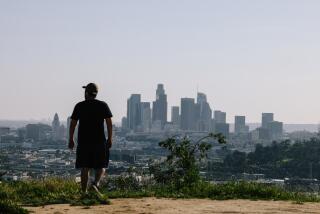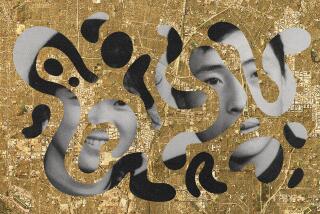Plan to Convert Liquor Stores Unveiled : Rebuilding: Using a $260,000 city grant, a coalition of community groups intends to help owners whose markets were destroyed in the riots switch to other businesses.
A coalition of African-American and Asian-American leaders Wednesday unveiled a new project to help South-Central Los Angeles liquor store owners whose businesses were destroyed during last year’s riots convert to other types of businesses.
The Liquor Store Conversion Program, which starts this week with a $260,000 grant from the city, was developed by the Asian Pacific Planning Council and the Asian Pacific Americans for a New L.A., a consortium of 40 community groups, with the support of the Community Coalition for Substance Abuse Prevention and Treatment, the organization that has spearheaded the campaign to rebuild South-Central without liquor stores.
“The issue of rebuilding liquor stores in South-Central has become a volatile flash point in the effort to rebuild L.A.,” Deborah F. Ching, president of the Asian Pacific Planning Council, said during a news conference in front of City Hall. But Asian-Americans and African-Americans working together have come up with a solution that both South-Central residents and liquor store owners can live with, she said.
Karen Bass, executive director of the community coalition, which gathered more than 30,000 signatures in petitioning to reduce the number of liquor stores in South-Central, agreed. In addition to assisting victims of the civil unrest, she said her organization is committed to participating in the new program by searching out African-American and Latino liquor store owners who will convert to other businesses.
Operators of about three dozen Korean-American and a handful of African-American liquor stores have expressed interest, program planners said. The program has enough funding to accommodate 60 applicants in its first year. And supporters expect to receive more private and public money to assist more people.
“We want to go back to work,” said Sung-Ho Joo, unemployed since his market at 52nd Street and Avalon Boulevard was destroyed during the civil unrest. “After a year of being unemployed, most riot victims are on the verge of bankruptcy,” said Joo, president of the Korean-American Grocery Victims Assn.
Joo said he hopes to start a self-service laundry, if the city waives sewer hookup fees for riot victims willing to change their line of business. Sewer hook-up fees are $2,200 per washing machine.
Daniel Whang, another Korean-American liquor store owner, said the thought of changing jobs scares him: “It’s like a violinist trying to become a construction worker.”
Still, the anti-liquor store sentiment in the community has persuaded him to take a chance, Whang said.
Fewer than a third of the businesses destroyed during the riots are back in operation.
Ida Harper and Dorotha Steed, partners in D & H Market on West Manchester Boulevard, said they have been thinking of eliminating alcoholic beverages at their store, too. “People come in at 9 a.m. and drink malt liquor the first thing in the morning like I have a cup of coffee,” Harper said. “I don’t feel good about playing a part in that.” So she and her business partner are looking to find other products to sell, such as vitamins and health foods.
As planners envision it, the liquor store conversion project will offer a variety of services tailored to individual business owners.
For example, for Asian and Latino immigrant entrepreneurs, the project would offer classes in multiculturalism, along with information on city codes and permit processes.
“We want to make this a model program not only for Los Angeles and California, but for the entire country,” Ching said.
More to Read
Sign up for Essential California
The most important California stories and recommendations in your inbox every morning.
You may occasionally receive promotional content from the Los Angeles Times.










